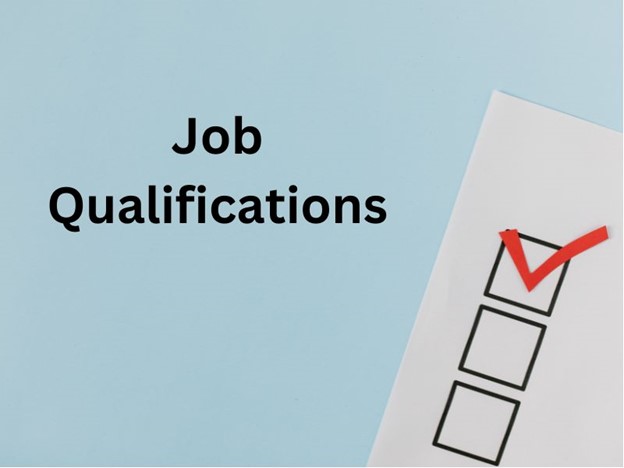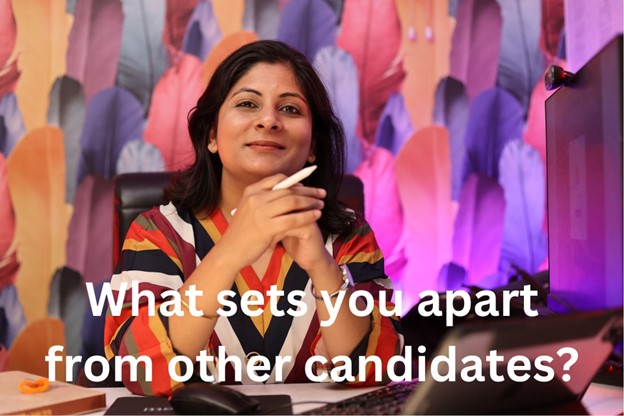Being asked “What sets you apart?” during a job interview can be challenging. Mainly because, as a candidate, you often have no clue about the others who have applied, making it nearly impossible to compare yourself to them.
However, the goal is not to feel daunted. With a little interview preparation, you can confidently answer this question. Here are some expert tips to help you prepare for such interview questions:
Understanding the Purpose of the Question
Firstly, it’s vital to understand why interviewers ask this specific question. They’re not seeking reasons why others are inferior, but they want to understand the unique strengths and experiences you can bring to the table that could benefit the company.
Essentially, this question offers you an opportunity to explain why they should hire you above everyone else. Companies hire people to solve problems, whether it’s boosting sales or maintaining a brand, and your answer should convey your ability to resolve their issues better than anyone else.
Some of the reasons why interviewers ask the question ‘What sets you apart’ are:
- Assess Unique Skills and Abilities: Interviewers ask “what sets you apart” to understand the unique skills, abilities, or experiences that you bring to the role that might be distinct from other candidates.
- Evaluate Self-Awareness: This question helps interviewers assess your self-awareness. They want to know if you understand your own strengths and how they relate to the job you’re applying for.
- Identify Potential Value: By asking this question, interviewers are trying to identify the potential value you could add to the team or company if you were hired.
- Understand Your USP: The question helps interviewers understand your unique selling proposition (USP). It allows them to gauge what makes you different from other candidates in terms of skills, experiences, or perspectives.
- Check Compatibility: This question can also indicate how well you would fit into the company culture. If what sets you apart aligns well with the company’s values and mission, it shows you’re likely to be a good fit.
- Gauge Confidence: Interviewers can use this question to gauge your confidence. How you answer can show how comfortable you are in promoting your abilities, indicating your self-belief and confidence.
- Assess Communication Skills: Your response can also demonstrate your communication skills. A well-structured, clear, and concise response shows that you can effectively communicate complex ideas.
- Identify Problem-Solving Skills: If what sets you apart is a unique way of problem-solving or a particular methodology you use, it can show interviewers that you have the ability to think creatively and solve problems efficiently.
- Identify Drive and Passion: If what sets you apart relates to a personal passion or a drive to succeed in your field, it can indicate to the interviewer that you are motivated and enthusiastic about your work.
- Measure Accountability: Lastly, by asking this question, interviewers can gauge your level of accountability and responsibility. If you can cite instances where what set you apart led to successful project completion or problem resolution, it shows you’re someone who takes accountability for your actions.
Formulating Your Answer: Key Steps

- Stay on Topic: As part of your interview preparation, keep your answers relevant to the role you’re interviewing for. Think about the key skills required for the job and explain how your abilities make you the top fit over all the other candidates.
Some tips to stay on topic during a job interview are:
- Understand the Job Role: Before the interview, thoroughly understand the job description and requirements. Keeping these in mind throughout the interview can help you stay focused and relevant in your responses.
- Structure Your Answers: A well-structured answer can help you stay on point. Consider using techniques like the STAR method (Situation, Task, Action, Result) to frame your responses in a way that directly ties your experiences to the job requirements.
- Practice Active Listening: Pay close attention to the interviewer’s questions. This will help you fully understand what they’re asking and formulate an on-topic response. If you’re unsure, it’s okay to ask for clarification.
- Keep Examples Relevant: When sharing examples or stories, ensure they’re directly relevant to the job you’re interviewing for. Relate your experiences back to the skills and attributes required for the role.
- Avoid Unnecessary Details: While it’s good to provide context, try to avoid going into too much detail about unrelated matters. Keep your responses concise and focused on demonstrating how your skills and experience make you a good fit for the role.
- Research the Job Requirements: It’s useful to list the job requirements. Check if the company has detailed their requirements in the job description. If not, research similar job titles on various websites and look for ads clearly describing what employers seek in potential employees.
Some tips to research the job requirements during interview preparation are:
- Study the Job Description: This is your primary source of information about the job requirements. Look at the qualifications, skills, and experience required, and consider how your background aligns with these needs.
- Visit the Company’s Website: Go through their ‘About Us’, ‘Services’, ‘Products’, or ‘Our Team’ sections. Understanding the company’s mission, values, and products/services can give you an insight into the kind of skills and experience they value.
- Use LinkedIn: LinkedIn can be a valuable resource. Look at profiles of employees working in similar roles at the company to understand the skills and experience they possess.
- Industry Research: Look at similar job postings in the same industry to understand common trends and requirements. Industry-specific blogs, forums, and professional groups can also provide insight into the skills and qualifications that are currently in demand.
- Informational Interviews: If possible, arrange informational interviews with current or former employees of the company. They can provide first-hand information about what the job entails and what the company values in its employees.

- Make a List of Your Qualifications: Once you have an understanding of the job requirements, compare your skills and qualifications against them. Choose a few of your strengths that align with the job requirements and use these as the backbone of your answer about what makes you unique among other candidates.
Some tips on how to prepare the list of your qualifications relevant for a job interview:
- Review Your CV: Start by looking at your CV/resume and highlighting the experiences, skills, qualifications, and accomplishments that are relevant to the job you’re interviewing for.
- Identify Key Skills: Identify key skills that align with the job description. These can be hard skills, like proficiency in a foreign language or familiarity with specific software, as well as soft skills, such as teamwork or problem-solving abilities.
- Use the STAR Method: For each qualification, prepare a brief example using the STAR method (Situation, Task, Action, Result) to provide context and illustrate how you have used the skill or qualification in a real-world scenario.
- Prioritise Your List: All qualifications are not created equal. Prioritise your list based on the job description. The most relevant and impactful qualifications should be at the top of your list.
- Update Certifications and Courses: Ensure any professional certifications, courses, or continuous learning you’ve undertaken are up-to-date. This can help show that you’re committed to your professional development and staying current in your field.
- Out-Do the Other Candidates: Guess what other candidates might say and think of examples that illustrate how you can surpass everyone else in these areas.
Some tips on how to out-do other candidates in job interviews:
- Research Thoroughly: Understand the company, its culture, values, and the specific role you’re applying for. By doing so, you’ll demonstrate a genuine interest in the organisation and position, which can set you apart.
- Prepare Personalised Answers: While preparing for common interview questions, personalise your responses. Use concrete examples from your past experiences to show how you’ve dealt with situations relevant to the role.
- Highlight Unique Skills: If you have unique skills or experiences that are beneficial to the role, make sure to highlight them. This could include specialised certifications, proficiency in multiple languages, or an uncommon combination of skills.
- Show Enthusiasm: Be enthusiastic about the role and the company. This can make you more memorable and demonstrate your genuine interest in the opportunity.
- Ask Insightful Questions: At the end of the interview, you’ll typically have a chance to ask questions. Use this opportunity to ask insightful questions that reveal your understanding of the role and the company. This can leave a lasting impression and set you apart from other candidates.

- Focus on Your Uniqueness: During your interview preparation, think about what makes you a unique fit for the position. Try to identify one or two qualities or experiences that differentiate you from others or that are generally hard to find in potential employees.
Some ways to prove that you are a unique fit for a job role:
- Showcase Unique Skills: Your unique skills and abilities can make you stand out from other applicants. Whether you have a special certification, knowledge in a specific software, or an unusual combination of skills, make sure you highlight them during the interview.
- Leverage Past Experiences: Discuss your unique experiences and how they’ve shaped your career. Relate these experiences to the job role you’re applying for, demonstrating how they’ve prepared you for the challenges you might face.
- Highlight Personal Achievements: Discuss personal achievements or projects that you’re particularly proud of. These could be related to previous work, volunteer experiences, or even personal projects. They can show your dedication, determination, and commitment, which are valuable qualities for any job role.
- Emphasise Cultural Fit: Being a cultural fit for the company is equally important. Do your research and understand the company’s values, mission, and work environment. Show how these align with your own values and how you can contribute to the company’s culture.
- Demonstrate Your Passion: Passion often sets a candidate apart. Show your enthusiasm for the role and the industry, and discuss how your interest in the field has influenced your career choices and goals. Passion can often make up for areas where you might lack experience or skills, as it shows your motivation to learn and grow in the role.
Delivering the Perfect Answer

- Understanding Your Biggest Strengths: Part of preparing for this question involves making a list of your skills and strengths. Some might be general, while others are more unique. While it’s important to share these strengths, remember the interviewer is looking for your unique strengths and what you can bring to the company that other candidates can’t.
- Understand the Strengths Most Important to the Job: An effective response isn’t just about listing a unique skill you possess. It’s crucial to identify the strengths most important to the job you’re being interviewed for.
- Forget the Other Candidates: In the actual interview, avoid comparing yourself to the other candidates, especially since it’s likely you don’t know them.
- Focus on Your Personal Profile: Instead of concentrating on other candidates, focus on your profile and what you can bring to the role. The employer wants to see how well you know your strengths and how your experience could benefit the role you’re applying for.
- Avoid Badmouthing Other Candidates: Keep it professional. If you’re interviewing for an internal role or a promotion, compare your experience and qualifications to those of your contemporaries without focusing on their personality traits or past incidents at the company.
- Remember the Role You’re Applying For: Keep your answers relevant. Think about the role on offer and how your skills and experiences fit it. You need to truly believe that you’re the best person for the job and be able to explain why.
For each strength or skill on your list, think of a specific time you used these traits to achieve something at work. Keep your answer short and to the point, focusing on one or two specific qualities that make you perfect for the position.
In summary, your story should illustrate why you should get the job over everyone else. Think about which of your experiences and qualifications make you a better fit than the competition. This question is about what truly sets you apart.
It’s time to be confident about your strengths and really sell yourself to the interviewer. Be positive and remember to reiterate your interest in the company and the job itself. By following these steps in your interview preparation, you’ll be well-equipped to impress in your job interviews.





